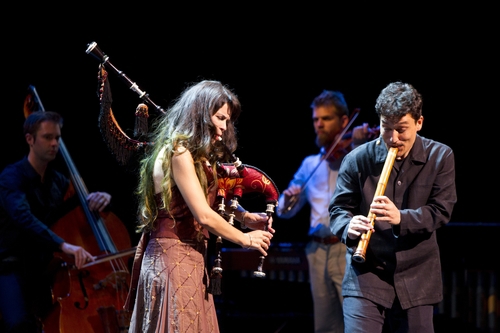MUSICAL FUSION: THE 15TH ANNIVERSARY OF THE SILK ROAD ENSEMBLE
Vancouver Playhouse, November 1, 2013
Founded by Yo-Yo Ma in 1998, the Silk Road Ensemble has already built a legendary reputation for integrating and bringing to life the music of diverse cultures, and for their imagination in taking this to different audiences. Underlying this inspiration of course is a deep human concern: that a world with cultural sharing, learning and understanding is better than one without it, and that music can serve as universal language that draws us together. The Silk Road Ensemble can draw on more than 50 players for its performances. In the final concert of its 15th Anniversary Tour, we saw eleven of them in a programme that highlighted Celtic, Spanish, Persian, Indian, Arabian and Chinese influences. Three of the most notable ‘authentic’ instruments involved were the gaita (Galician bagpipe), shakuhachi (Japanese flute) and kamache (single-string fiddle), all played with consummate skill.
The opening Silk Road Suite and the closing Suite from the Book of Angels (John Zorn) were certainly successful in showing the variety of instrumental timbres and rhythms offered by the ensemble. These featured keen pacing and an alert contribution from all in a sort of jazzy, folksy way, crowned by the haunting and sensual gaita-playing of Cristina Pato, who seemingly could summon up Galician elemental forces whenever required. The Arabian Waltz from the first suite highlighted what the ensemble is especially good at: building strong rhythmic momentum out of short, repeated dance-like figures with imaginative instrumentation.
While the improvised duet (‘Jugalbandi’) for spike fiddle and drums was fun to watch, some of other musical fusions seemed more arbitrary and thin in content, also revealing that the group has a weaker expressive palette when the music is not rhythmic. ‘Celtiberra’ started from somewhat sentimentalized presentation of a simple Celtic theme and somehow moved this into a wild Spanish melee. It was somewhat like taking a section from Bantock’s Celtic Symphony and suddenly switching to Chabrier’s Espana. But why? Colin Jacobsen’s Persian homage ‘Atashga for Kamache and Strings’ promised deep feelings but ended up as sort of a pale copy of Vaughan Williams’ Tallis Fantasia and/or his Lark Ascending, without the inward ethereal beauty or intensity of either. Angel Lamb’s Empty Mountain, Spirit Rain, on the theme of childhood desolation, should have taken us on a real journey but lacked constructional complexity. Just using imitative string passages and selective tremolando is hardly a recipe to introduce novel tensions, and the music only took flight sporadically. Certainly, the two concertos for ancient Chinese ‘sheng’ (written by Asian composers) that we have seen in recent years, with the Seoul Philharmonic and the Hong Kong Sinfonietta, yielded richer and deeper experiences.
In many ways, the above qualifications do not matter. While there may have been less than involving pieces in this concert, the cumulative effect of hearing all the different, exotic instrumental experiments did add up to a genuine experience: it allowed us ‘to sample the food and drink the wine’ of a variety of unusual musical cultures, and perceive their spirit. As a celebration of a group that has worked so hard to foster humanitarian objectives through the Silk Road Project, the concert also showcased the ‘feel good together’ attitude that has allowed the ensemble to reach out and communicate to so many groups, including the 600 children they met before the concert began.
One can debate forever on whether an ‘international’ music which synthesizes traditional musical influences from all over can make a claim to authenticity. For the Silk Road, the ‘traditional’ musical instruments are authentic but, putting them all together with amplified modern strings (amplification unnecessary in the Playhouse by the way), is clearly not. The only element of affectation that I detect in these performances is that the ensemble seems a little too upbeat when things are happy and a little too soft and sentimental when conveying sadness. One may want to seek gentle means in bringing cultures closer together but we should not shy away from another humanitarian concern: namely, the real pain, cruelty, and bloodshed that coexists with so much of this traditional music and continues to do so to the present day.
© Geoffrey Newman 2013
THE CONCERT EXPERIENCE
Arabian Waltz
